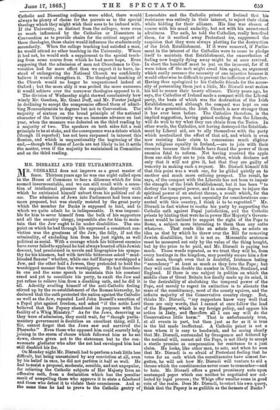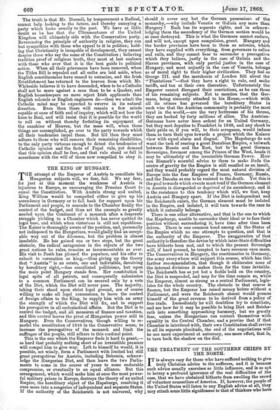MR. DISRAELI AND THE ULTR1MONTA_NES.
AfR. DISRAELI does not improve as a great master of fence. Thirteen years ago he was one night called upon In the House of Commons to face a dilemma which for him seemed insurmountable, and we can still recall with a sensa- tion of intellectual pleasure the exquisite dexterity with which he extricated himself unhurt from his political cud de .sac. The admission of Jews into Parliament had been once more proposed, but was stoutly resisted by the great party which the member for Bucks is supposed to lead, and to which we quite admit he is indispensable. It was impossi- ble for him to sever himself from the bulk of his supporters and all the country clergy, impossible also for him to main- tain that the Jew ought to lie under disabilities. The one point on which he had through life expressed a consistent con- viction was the greatness of the Jew, the folly, if not the criminality, of excluding him from his just rights, as well political as social. With a courage which his bitterest enemies have never failed to applaud he had always boasted of his Jewish descent, had proclaimed in novels and biographies his sympa- thy for his kinsmen, had with terrible bitterness asked " mud- blooded Saxons" whether, while one-half Europe worshipped a Jew, and the other half a Jewess, they pretended to hold the worshipped meaner than the worshippers. He had therefore in one and the same speech to maintain this his constant creed and yet to conciliate his party, to exalt the Jew and yet refuse to relieve him from a disabling oath, and he did it all. Adroitly availing himself of the anti-Catholic feeling stirred up by the re-establishment of the Roman hierarchy, he declared that the oath protected the nation against the Catholic as well as the Jew, repeated Lord John Russell's assertion of a Papal plot against freedom, and asked "if the noble Lord believed that the Papacy abandoned its purposes with the facility of a Whig Ministry." As for the Jews, deserving as they were of admission, they could wait, for " though parlia- mentary government is doubtless an excellent thing, still I, Sir, cannot forget that the Jews saw and survived the Pharaohs." Even those who opposed him could scarcely help joining in the storm of cheers which followed him as he sat down, cheers given not to the statesman but to the con- summate gladiator who after the net had enveloped him had still disabled his foe.
On Monday night Mr. Disraeli had to perform a task little less difficult, but being unsustained by any conviction at all, even by his belief in race, he did not perform it half so well. He had to resist a proposal, moderate, sensible, and not unpopular, for relieving the Catholic subjects of Her Majesty from an offensive oath, from a declaration which has the peculiar merit of compelling those who approve it to state a falsehood and those who detest it to violate their consciences. And at the same time he had to prove to the Catholic gentry of Lancashire and the Catholic priests of Ireland that his resistance was entirely in their interest, to reject their claim while bidding for their alliance. His line was chosen of course with his usual audacity, but not with his accustomed adroitness. The oath, he told the Catholics, really benefited them, for it soothed away Protestant ire, suppressed the suspicion that they were always plotting for the destruction of the Irish Establishment. If it were removed, if Parlia- ment in the interest of the Catholics were to cease to pledge itself to maintain that Establishment, the exacerbation of feeling now happily dying away might be at once revived. In short the handcuff must be put on the innocent, for if it were taken off the mob might assail him again, an argument which coolly assumes the necessity of one injustice because it would otherwise be difficult to prevent the infliction of another. Having thus apologized to his Catholic friends for the neces- sity of persecuting them just a little, Mr. Disraeli next makes his bid to secure their hearty alliance. Thirty years ago, he says, the Catholics of Ireland made a compact with the Liberal party, the basis of which was the destruction of the Irish Establishment, and although the compact was kept on one side for a generation, the Irish Church is now stronger than it has ever been before. The Catholics therefore, is the implied suggestion, having gained nothing from the Liberals, will do well to try what they can obtain from the Tories. In other words, the Catholics, not having destrOyed the Establish- ment by Liberal aid, are to ally themselves with the party which neutralized the effect of that aid, and which is even now resisting their claim to concessions much slighter than religious equality in Ireland,—are to join with their enemies because their friends have found the power of those enemies fatal to reform. Not having received the apple from one side they are to join the other, which declares not only that it will not give it, but that they are guilty of temerity in making such a request. Mr. Disraeli himself felt that this point was a weak one, for he glided quietly on to another and much more enticing prospect. The result, he says, of the compact with the Liberals has not been to impair the strength of the Irish Establishment, but it has been " to destroy the temporal power, and in some degree to injure the spiritual power of an ancient throne, a result which, for the sake of European peace, and especially for considerations con- nected with this country, I think is to be regretted." Mr. Disraeli in fact wishes to soothe his party by supporting the Catholic oath against Papal jurisdiction, and the Catholic priests by hinting that were he in power Her Majesty's Govern- ment would be inclined to support the right of the Pope to Rome, a subject more interesting to them than any oaths whatever. That reads like an astute idea, as astute an idea as that by which he threw over the Bill for removing Jewish disabilities, but it is not so. Mercantile acuteness must be measured not only by the value of the thing bought, but by the price to be paid, and Mr. Disraeli is paying too much. Those words repeated, as we trust they will be, from every hustings in the kingdom, may possibly secure him a few Irish seats, though even that is doubtful, Irishmen hating " ascendency " at least as much as they love the Pope ; but they will cost him double the number in Ulster, Scotland, and England. If there is one subject in politics on which the middle class of Great Britain has finally made up its mind, it is the desirability of abolishing the temporal power of the Pope, and merely to regret its extinction is to alienate the mass of the constituency, most of the county squires, and the infinite majority of the Conservative country clergy. But, thinks Mr. Disraeli, "my supporters know very well that these are only words, that I cannot at once follow the lead of the Emperor, which is my foreign policy, and oppose his action in Italy, and therefore all I can say will do the Conservatives little harm." That is unfortunately true, at all events in part, but then just as far as it is true is the bid made ineffectual. A Catholic priest is not a man whom it is easy to hoodwink, and he seeing clearly that Mr. Disraeli, surrounded by Orangemen and fettered by the national will, cannot aid the Pope, is not likely to accept a sterile promise as compensation for resistance to a just claim. He looks, like other men, to acts, and when he sees that Mr. Disraeli is so afraid of Protestant feeling that he votes for an oath which the constituencies have almost for- gotten, he will ask how Mr. Disraeli will venture to aid a throne which the constituencies never cease to remember—and to hate. Mr. Disraeli offers a grand promissory note upon undamped paper which can neither be negotiated nor col- lected by legal process ; the Whigs offer smaller sums in good coin of the realm. Does Mr. Disraeli, to retort his own query, think that the Papacy is as gullible as the farmers of Bucks ? The truth is that Mr. Disraeli, by, temperament a Radical, cannot help looking to the future, and thereby annoying a party which looks usually to the past. We have as little doubt as he has that the Ultramontanes of the United Kingdom will ultimately side with the Conservative party. Reverencing the principle of authority in religion, they can but sympathize with those who appeal to it in politics; hold- ing that Christianity is incapable of development, they cannot despise those who say the same, of the Constitution ; believing tradition proof of religious truth, they must at last coalesce with those who aver that it is the best guide in political action. When all their grievances have been removed, when the Titles Bill is repealed and all oaths are laid aside, when English constituencies have ceased to ostracize, and the Irish Establishment has returned to the heaven from which Mr. Whiteside believes it to have descended, when to be a Catholic shall not be more against a man than to be a Quaker, and English housekeepers no more reject Irish applicants than English colonels or English engineers do—then, we admit the Catholic mind may be expected to swerve in its natural direction. Even then there will remain a few minds capable at once of faith and of inquiry, which will not bow the knee to Baal, and will insist that it is possible for the world to roll on without thereby forfeiting its enjoyment of the sunshine of Heaven, but the mass will, when those things are accomplished, go over to the party towards which all their tendencies impel them. But till then they must adhere to those who will remove their remaining disabilities, to the only party virtuous enough to detest the tendencies of Catholic opinion and the facts of Papal rule, yet demand that this opinion shall be free, and that rule stand or fall in accordance with the will of those now compelled to obey it.































 Previous page
Previous page